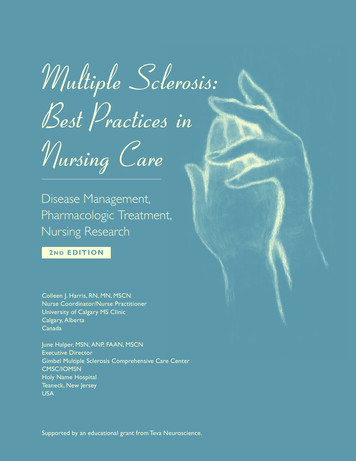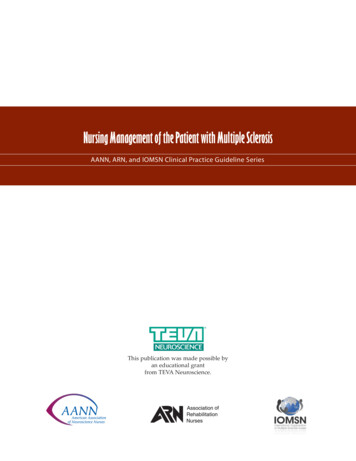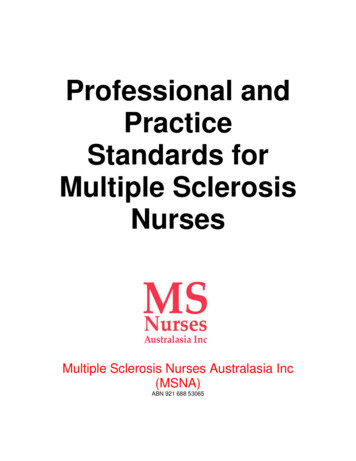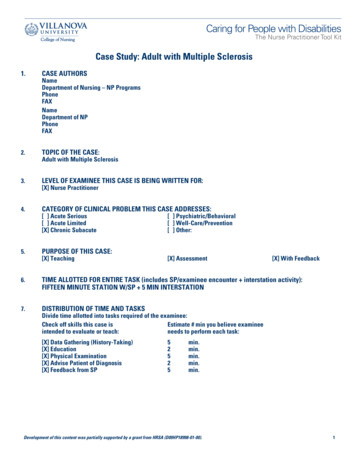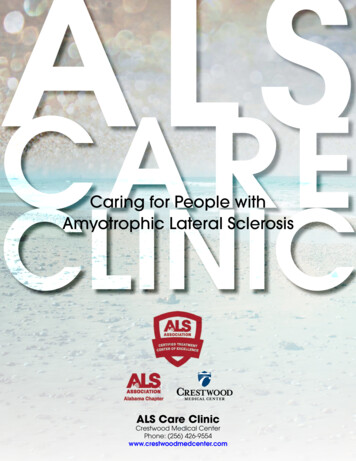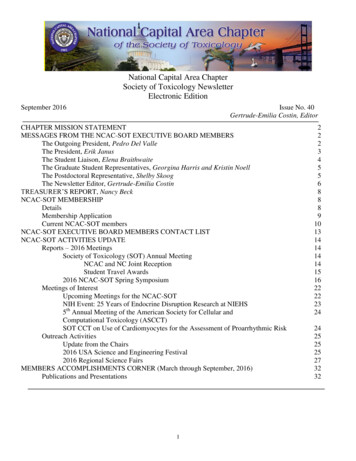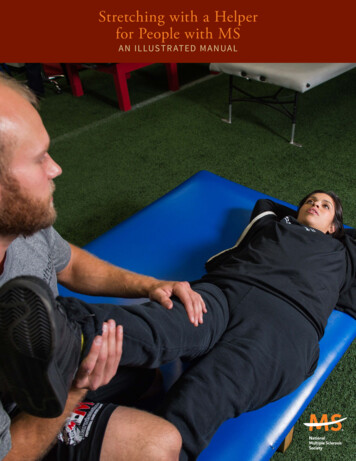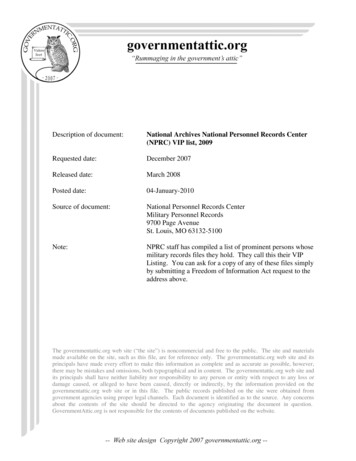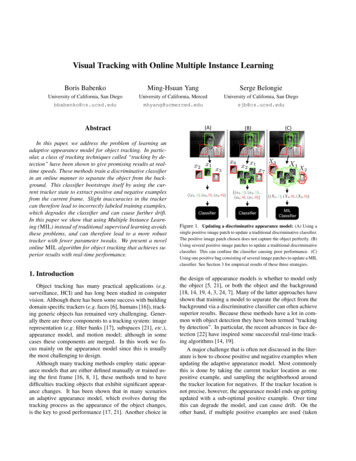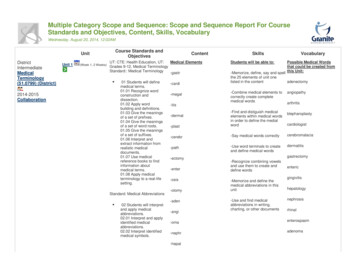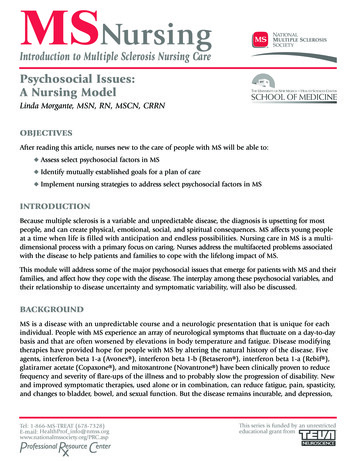
Transcription
MSNursingIntroduction to Multiple Sclerosis Nursing CarePsychosocial Issues:A Nursing ModelLinda Morgante, MSN, RN, MSCN, CRRNOBJECTIVESAfter reading this article, nurses new to the care of people with MS will be able to: Assess select psychosocial factors in MS Identify mutually established goals for a plan of care Implement nursing strategies to address select psychosocial factors in MSINTRODUCTIONBecause multiple sclerosis is a variable and unpredictable disease, the diagnosis is upsetting for mostpeople, and can create physical, emotional, social, and spiritual consequences. MS affects young peopleat a time when life is filled with anticipation and endless possibilities. Nursing care in MS is a multidimensional process with a primary focus on caring. Nurses address the multifaceted problems associatedwith the disease to help patients and families to cope with the lifelong impact of MS.This module will address some of the major psychosocial issues that emerge for patients with MS and theirfamilies, and affect how they cope with the disease. The interplay among these psychosocial variables, andtheir relationship to disease uncertainty and symptomatic variability, will also be discussed.BACKGROUNDMS is a disease with an unpredictable course and a neurologic presentation that is unique for eachindividual. People with MS experience an array of neurological symptoms that fluctuate on a day-to-daybasis and that are often worsened by elevations in body temperature and fatigue. Disease modifyingtherapies have provided hope for people with MS by altering the natural history of the disease. Fiveagents, interferon beta 1-a (Avonex ), interferon beta 1-b (Betaseron ), interferon beta 1-a (Rebif ),glatiramer acetate (Copaxone ), and mitoxantrone (Novantrone ) have been clinically proven to reducefrequency and severity of flare-ups of the illness and to probably slow the progression of disability. Newand improved symptomatic therapies, used alone or in combination, can reduce fatigue, pain, spasticity,and changes to bladder, bowel, and sexual function. But the disease remains incurable, and depression,Tel: 1-866-MS-TREAT (678-7328)E-mail: HealthProf info@nmss.orgwww.nationalmssociety.org/PRC.aspThis series is funded by an unrestrictededucational grant from
page 2Introduction to Multiple Sclerosis Nursing Care:Psychosocial Issues: A Nursing Modelhelplessness, and hopelessness are common among the MS population (Fischer & Crawford,1994). Nurses are presented with a challenge when assessing the psychosocial impact of thedisease on the person with MS and others in their lives. In some ways, it is easier for thepatient and nurse to deal with the physical manifestations of MS than to address the psychosocial issues. Helping the patient to cope with psychosocial issues requires a high level of empathyand unconditional regard from the nurse.ASSESSMENTThe nursing process frames nursing practice, and is useful when caring for the psychosocialconcerns of the person with MS. The major areas of the assessment include: mood; self-esteem,self-efficacy, and self-care; relationships; life-style changes; and hope.MoodWhen assessing how a person is responding emotionally, the nurse can fairly quickly and easilyattend to mood by observing a person’s body language, tone of voice, and expressions of optimismversus pessimism. Fear, anger, anxiety, and depression are associated with a general perception ofloss of self-control (Kerns, 2000), and are common manifestations of the illness particularly whenthe disease is new, flaring up, or transitioning to a progressive course. How people are dressed andgroomed, their ability to make eye contact, their posture in a chair, the spring in their step, theirfacial expressions, and the content of their conversation can help a nurse determine mood at anyparticular time. Assessing patterns of sleeping, eating, sexual functioning, and adhering to therapeutic regimens also provide clues to a person’s emotional state.Self-esteem, self-efficacy, and self-careSelf-esteem, self-efficacy, and self-care are important concepts that, independently and incombination, help predict a person’s ability to cope with an illness. Self-esteem is an aspectof self-concept that reflects how adequate and worthwhile a person feels. Self-efficacy meansthat a person believes he/she is competent and capable of accomplishing a task. Self-efficacyhas been shown to predict adherence to therapeutic regimens in a variety of chronic illnesses.A study of patients taking glatiramer acetate (Copaxone) (Fraser et al, 2001) showed a statistically significantly higher level of self-efficacy among people who maintained regular injectionschedules over a one-year period. Because confidence and competence can predict how wellpeople will take care of themselves, inquiring about dietary habits, use of dietary supplementsand complementary therapies, exercise regimens, and methods of coping with stress areimportant areas for nursing assessment.RelationshipsSocial support is an important aspect of coping with chronic illness. Social support has beenwell documented in the literature as a predictor of coping, and includes provisions for attachment and intimacy, feeling connected to others who share similar experiences, communicating
page 3Introduction to Multiple Sclerosis Nursing Care:Psychosocial Issues: A Nursing Modeland networking with others, and having access to family, friends, and health care providers whocan care for emotional and physical needs (Weinert, 1989).The nurse can assess this realm by noting who accompanies the person to the doctor’s visits,asking the person to identify key players who are perceived to be supportive, and exploring howthe person accesses the help of these individuals when in crisis.Lifestyle changesAssessing a person’s role in the family, workplace, and among friends helps to establish abaseline by which to measure future changes in role. People who are accustomed to a leadership role and perceive themselves as being in control have more difficulty coping when MSaffects their physical and cognitive selves. Losing mobility can not only bring about a loss ofindependence, but also can force people out of the workplace and prevent previously enjoyedleisure activities, causing social isolation. Simply asking the person, “how do you see yourself atthe workplace,” or “what is your role in your family,” can uncover valuable information andhelp establish a sense of how a person will cope with role changes in the future. Other areasthat can be included in the lifestyle assessment include means of transportation; disclosureof MS to family, friends, and co-workers; hobbies and pastimes; and financial concerns,including insurance.HopeHope helps people with MS to continue to live more successfully with their disease. Hopefulfeelings improve a person’s self-esteem and well being, and may have a synergistic effect onconventional therapies. Nurses can assess behaviors that reflect hope in the people they carefor. Hopeful people are able to verbalize their goals, are motivated to achieve their goals,expect to accomplish their goals, and are able to make alternative plans if their goals are notachieved. They can imagine that if they feel bothered by symptoms of MS one day, the nextday holds the possibility that the symptoms will improve. People who can remember howthey coped successfully with difficult situations in the past, can recognize all of their options,feel in control, and are not overwhelmed by any given situation, are generally more hopefulindividuals. Supportive and reciprocal relationships, feeling connected to a Higher Being,using humor, and relaxing with modalities like meditation and yoga are all signs of a moreoptimistic person (Morgante, 2000).GOALSNursing care to ease the psychosocial burdens associated with MS include improving mood,bolstering self-esteem and self-efficacy, promoting self-care, facilitating relationships, preserving lifestyle, and inspiring hope. Achieving the goals of each of these interconnected conceptsrequires creativity, ingenuity, and alterations to the nursing care plan as the patient’s condition changes.
page 4Introduction to Multiple Sclerosis Nursing Care:Psychosocial Issues: A Nursing ModelINTERVENTIONSEducation, counseling, advocacy, and referrals are nursing measures used everyday in practiceto achieve the goals mutually established with patients and families. Nursing education andcounseling are important interventions that help to alleviate fears and anxieties in people withMS. The nurse is a knowledgeable resource for clarifying information about the disease andits manifestations. Offering support, reassurance, and follow-up in person and via the telephone help people with MS connect with the nurse. This connection creates a lifeline forpatients dealing with the challenges of living with MS.EducationTeaching patients how to care for themselves, how to manage symptoms, how to cope withstress, and how to maintain optimal health and wellness is a primary nursing intervention. Theeducation process often includes family and friends which helps support relationships. Teachingpatients to deal with symptoms such as fatigue, urinary urgency and incontinence, constipation,and pain is a life enhancing measure that helps to improve a patient’s mood by empoweringself-care.Finding the time to teach patients is an ongoing nursing challenge in a health care environmentthat does not support extended time for office visits. Planning a brief education session at eachvisit helps the nurse to maximize time and energy. Handouts, booklets, and teaching in groupsettings are some ways to cope with the limits imposed by the health care system.CounselingDepression is more common in MS than in any other chronic illness. It is estimated that up to60% of the people with MS will experience one major depressive episode during the illness(Schiffer et al, 2001). Anger and hostility are manifestations of depression, and can often bediffused by using a calm tone of voice and a gentle touch. Counseling patients to deep-breathe,learn ways to relax, and nurture the spiritual self are nursing interventions that improve moodand inspire hope. Pharmacologic interventions may also help to alleviate depression. The newerclass of selective serotonin re-uptake inhibitors (SSRIs) are frequently tried as an initial intervention to relieve symptoms of depression. There are anecdotal reports that the use of SSRIs willalso reduce fatigue in a select group of people with MS (Krupp, 2002), particularly if theirfatigue is secondary to their depression.Involving family and friends in the plan of care is an essential element of the counseling process.People often focus their hopes on others. The desire to remain emotionally strong, to live longer,and to remain as healthy as possible for the welfare of others is a valuable healing force thatcan be nurtured by the nurse whenever possible.If looking ahead becomes too painful, or creates unnecessary fear and anxiety in a person whofaces uncertainty because of the nature of MS, the nurse can help reframe the experience to lookat what is hopeful in the moment. A song, a photograph, a poem, a flower, a hug, a kiss, a
page 5Introduction to Multiple Sclerosis Nursing Care:Psychosocial Issues: A Nursing Modelsnowflake, a candle, a fragrance, the sun, stars, or the moon shining brightly are just a few oflife’s simple pleasures that bring joy, and are easy to access.AdvocacyNurses are at the forefront of advocating with third-party payers, employers, and the communityfor better access to care and for quality of life for people with MS. Nursing measures that supportthe advocacy role include ensuring that the workplace remains barrier free, encouraging alternative transportation modalities, writing letters for parking permits, providing medical justificationfor diagnostic testing and medications, promoting life planning and use of legal directives(including advance directives), and exploring disability rights and eligibility (Northrup, 2002).ReferralsMaintaining solid relationships with good referral sources is an important nursing intervention. Referrals not only fortify the caring process, but also help people maximize abilities.Common referrals for people with MS include physical, occupational, and speech therapy;the local chapter of the National Multiple Sclerosis Society for services such as peer support;and medical consultations such as urology, gastroenterology, psychiatry, and ophthalmology.Other referrals may include nutritional support, home care, pain specialists, equipmentand supply vendors, and social services agencies.CONCLUSIONVarious psychosocial issues emerge for people living with a chronic disease like MS. The intimacyof the nurse-patient relationship provides an opportunity to identify and treat psychosocial issuesbefore they become problematic. For this article, mood; self-esteem, self-efficacy, and self-care;relationships; lifestyle changes; and hope were selected because of their relevance to nursingpractice. The nursing process was utilized as a framework to help nurses assess, plan, and developstrategies to treat these particular psychosocial realms.REFERENCESFischer J, Crawford P. Emotional aspects of multiple sclerosis. MS Clin Issues 1994;2:6–9.Fraser C, Hadjimichael O, Vollmer T. Predictors of adherence to Copaxone therapy in individualswith relapsing-remitting multiple sclerosis. J Neurosci Nurs 2001;33(5): 231–239.Kerns R. Psychosocial aspects of pain. Intl J MS Care 2000;2(4):1–7.Krupp L, Pattern S, Archibald C. Fatigue in multiple sclerosis: clinical significance and impacton patient quality of life. Image 2002;1–6.Morgante L. Hope in multiple sclerosis: a nursing perspective. Int J MS Care 2000;2(2):1–8.
Introduction to Multiple Sclerosis Nursing Care:Psychosocial Issues: A Nursing Modelpage 6Northrup D. Advocacy. In: Halper J, Holland, N, eds. Comprehensive Nursing
INTERVENTIONS Education, counseling, advocacy, and referrals are nursing measures used everyday in practice to achieve the goals mutually established with patients and families. Nursing education and counseling are important interventions that help to alleviate fears and anxieties in people with MS. The nurse is a knowledgeable resource for clarifying information about the disease and its .
